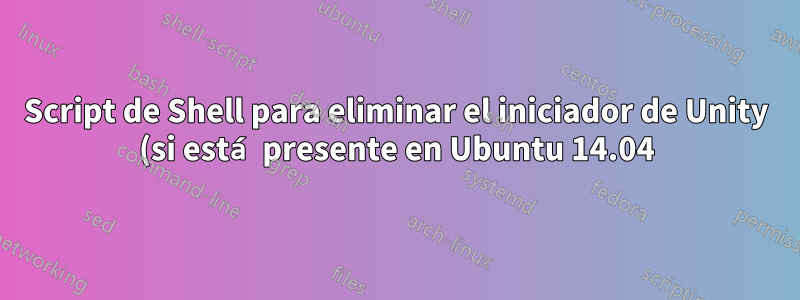%20y%2Fo%20el%20panel%20xfce%20(en%20el%20caso%20de%20xubuntu).png)
Solo quiero que el script de shell elimine el iniciador de Unity (si está presente en Ubuntu 14.04) y/o el panel xfce (en el caso de xubuntu).
Si alguien tiene una idea sobre lo mismo, hágamelo saber.
Gracias
Respuesta1
Actualizar:
Para eliminar completamente el iniciador durante el tiempo de ejecución del script, deshabilitaría el complemento Unity Compiz.
Tenemos tal guión enCaja, que estoy pegando aquí por conveniencia:
#!/usr/bin/env python3
# This file is part of Checkbox.
#
# Copyright 2014-2015 Canonical Ltd.
# Written by:
# Daniel Manrique <[email protected]>
# Sylvain Pineau <[email protected]>
#
# Checkbox is free software: you can redistribute it and/or modify
# it under the terms of the GNU General Public License version 3,
# as published by the Free Software Foundation.
#
# Checkbox is distributed in the hope that it will be useful,
# but WITHOUT ANY WARRANTY; without even the implied warranty of
# MERCHANTABILITY or FITNESS FOR A PARTICULAR PURPOSE. See the
# GNU General Public License for more details.
#
# You should have received a copy of the GNU General Public License
# along with Checkbox. If not, see <http://www.gnu.org/licenses/>.
"""
manage_compiz_plugin
====================
This script allows enabling or disabling compiz plugins using
gsettings. Changes take effect on the fly.
"""
from gettext import gettext as _
import argparse
import gettext
import os
import sys
import subprocess
import time
PATH="org.compiz.core:/org/compiz/profiles/unity/plugins/core/"
KEY="active-plugins"
gettext.textdomain("2013.com.canonical.certification.checkbox")
gettext.bindtextdomain("2013.com.canonical.certification.checkbox",
os.getenv("CHECKBOX_PROVIDER_LOCALE_DIR", None))
plugins = eval(subprocess.check_output(["gsettings", "get", PATH, KEY]))
parser = argparse.ArgumentParser(description=_("enable/disable compiz plugins"),
epilog=_("Available plugins: {}").format(plugins))
parser.add_argument("plugin", type=str, help=_('Name of plugin to control'))
parser.add_argument("action", type=str, choices=['enable', 'disable'],
help=_("What to do with the plugin"))
args = parser.parse_args()
if args.action == 'enable':
if args.plugin in plugins:
raise SystemExit(_("Plugin {} already enabled").format(args.plugin))
plugins.append(args.plugin)
else:
if args.plugin not in plugins:
raise SystemExit(_("Plugin {} doesn't exist").format(args.plugin))
plugins.remove(args.plugin)
subprocess.call(["gsettings", "set", PATH, KEY, str(plugins)])
time.sleep(3)
Para deshabilitar el complemento de Unity:
./manage_compiz_plugin unityshell disable
Para restaurarlo:
./manage_compiz_plugin unityshell enable
Primera versión(usando ocultación automática):
Para ocultar el iniciador de Unity, use los siguientes comandos:
dconf write /org/compiz/profiles/unity/plugins/unityshell/launcher-hide-mode 1
dconf write /org/compiz/profiles/unity/plugins/unityshell/edge-responsiveness 0
Para restaurarlo, simplemente use:
dconf write /org/compiz/profiles/unity/plugins/unityshell/launcher-hide-mode 0
dconf write /org/compiz/profiles/unity/plugins/unityshell/edge-responsiveness 2
Respuesta2
Si estás buscando un script para recompilar Unity sin el iniciador, esto debería ser exactamente lo que deseas: Compilar Unity sin lanzador


